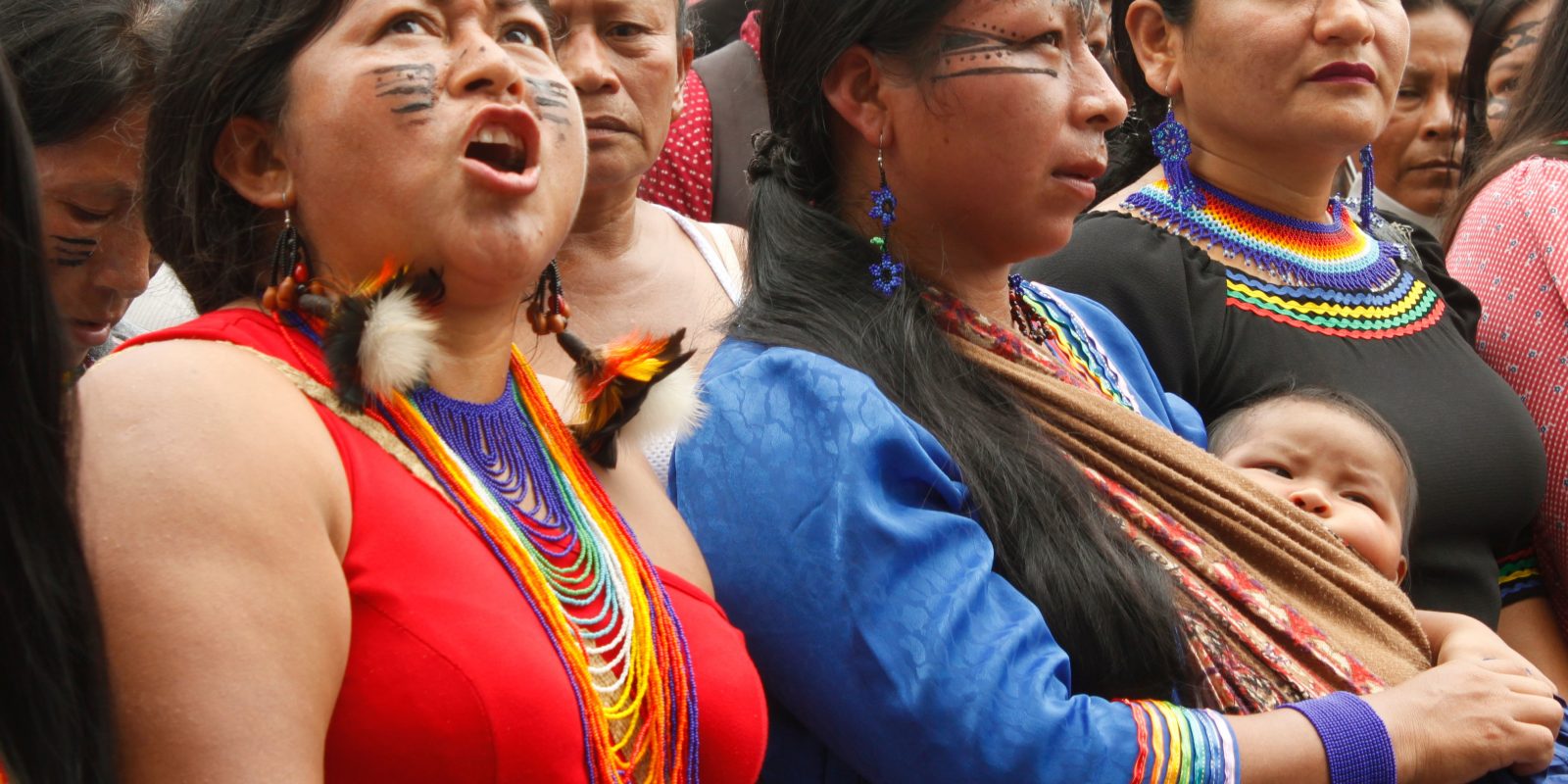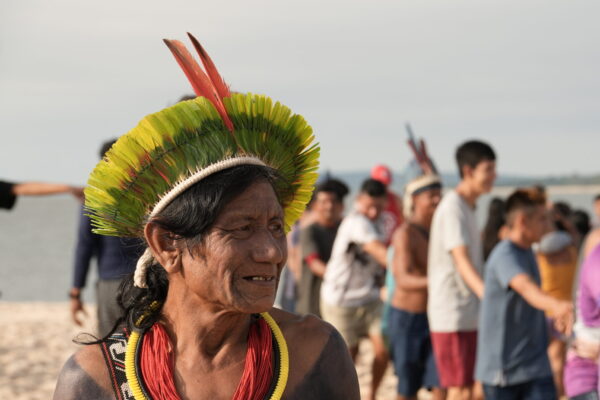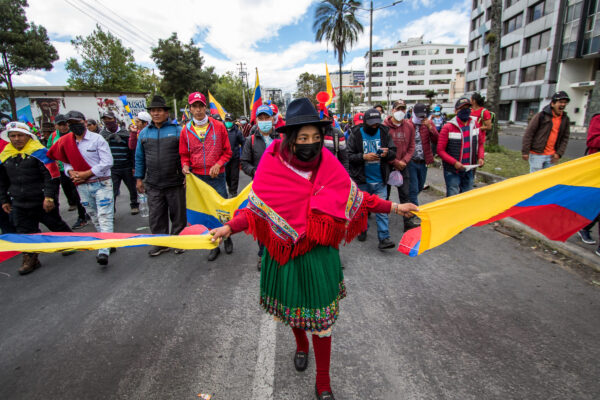Hundreds of Ecuadorian Indigenous people took to the streets of the Amazonian town of Coca yesterday to demand justice for the ongoing impacts of the country’s largest oil spill in recent history. A full year after 672,000 gallons of crude oil and fuel spilled from the country’s two major pipelines into the Coca and Napo rivers, there is still no comprehensive remediation nor redress for the 27,000 Kichwa Indigenous peoples affected. Amazon Watch’s team in Ecuador, alongside coalition partners, has been leading advocacy campaigns and maintaining pressure on the government and big banks financing the trade of this toxic commodity. The team is also supporting the communities seeking justice through technical assistance and legal strategy for the lawsuit, providing media support, and direct funding to affected communities.
Marching through the streets of Coca, the crowd of over 700 was also joined by Indigenous leaders from across Ecuador. They stopped in front of the courthouse to denounce a recent decision from the appellate court in March that rejected a legal action brought by the communities seeking emergency relief and remedy for the violations of their right to health, a clean environment, and the rights of nature. The action also called for pipeline operators to be held accountable for gross negligence in failing to prevent the spill. OCP and Petroecuador ignored repeated warnings and geological data that showed that the regressive erosion from a nearby dam had made the riverbanks unstable and compromised the pipeline infrastructure. Ecuador’s Ministry of the Environment and Water is supposed to oversee that the operators’ clean up their toxic mess, yet they are still protecting the polluters and have failed to act.
Adding insult to injury, the lower court judge Jaime Oña who presided over the case recently filed criminal charges against members of the legal team and President of the Kichwa organization Carlos Jipa for “defamation” related to social media posts during the trial that exposed irregularities in the trial and the judge’s long, unreasonable delay for an action seeking emergency injunctive relief that raised suspicion of collusion between the court and the companies. Curiously, both Jipa and members of the legal team were ordered to the District Attorney’s office to be deposed yesterday, the day of the march, marking one year since the spill. But Prosecutor Oscar Franco Chasiguasig was a no show.
“After contaminating our rivers and our territories, there has been complete impunity for the companies and government agencies responsible,” said Jipa. “And when we exercise our constitutionally guaranteed rights we are persecuted. This is a clear attempt to silence us. But we won’t be silenced. If the government does not guarantee our rights and the judiciary favors those who violate them, there is no other way than resistance! They treat us like we’re invisible. But today we are invisible no more. And we won’t stop until justice is served, and our communities can drink, fish, and swim in our rivers once again.”
The spill polluted the source of water and food of 105 communities. They still lack clean drinking water and are facing health impacts due to exposure to oil contamination. This water crisis increased their vulnerability during the COVID-19 pandemic, which continues unabated.
The pipeline operators, the privately run OCP Consortium and state-run Petroecuador, claim the spill has been sufficiently cleaned up. But oil is still visible along the riverbanks, stream sediment, and soil. Independent testing has shown high levels of presence of hydrocarbons, compounds that make up crude oil, and heavy metals like nickel and lead.
Over the course of the trial, the Ecuadorian government and oil companies presented absurd and misleading claims. Perhaps in light of their poor or non-existent remediation and spill contingency plan, they argued in court that “nature replenishes itself,” downplaying the long-term toxicity and harm that pollution poses for aquatic life and the food chain for local communities. The companies touted the “relief” they provided communities, but the food and three liters of water were not enough. And, according to the communities, the companies pressured people who accepted emergency food and water handouts to waive their right to take legal action.
The ongoing oil spills and rights violations by the industry and lack of accountability from government agencies or its judiciary is having bigger implications for the country. In August, Amazon Watch and Stand.earth produced a groundbreaking report exposing the role of six major European banks in the financing of trade in Amazon crude, violating their climate pledges and environmental and social safeguard policies. By January, all six banks stopped financing the trade of Ecuadorian crude over environmental and social issues. Collectively, the banks controlled 85% of the finance trade of oil from Ecuador, representing $10 billion over the last decade.
“Enough is enough,” said Marlon Vargas, President of CONFENIAE, Ecuador’s Confederation of Amazon Indigenous Nationalities. “Oil extraction has only brought us misery. We need to put an end to this destruction and start protecting our rights, territories, and cultures. That is the only way forward. At a moment when the Amazon is at a tipping point, it is the last place in the world there should be oil drilling. We are calling for an end to new extraction, a moratorium on current production until our rights can be guaranteed, and justice for all of our communities who continued to be poisoned by contamination.”
Yesterday’s march for justice in Coca is a new beginning for an area ravaged by oil extraction. There has never been greater unity among Indigenous peoples across the Ecuadorian Amazon in demanding justice for spills and rights violations, and in rejecting any new plans for expanded resource extraction. And this new power was on display in the country’s recent elections. The Indigenous political party won a record 26 Congressional seats, the second largest block. As well, an anti-mining referendum in the country’s southern province of Azuay backed by the Indigenous movement won in a landslide. The power and voice of Ecuador’s Indigenous peoples are only growing. It’s time to stand with them!













